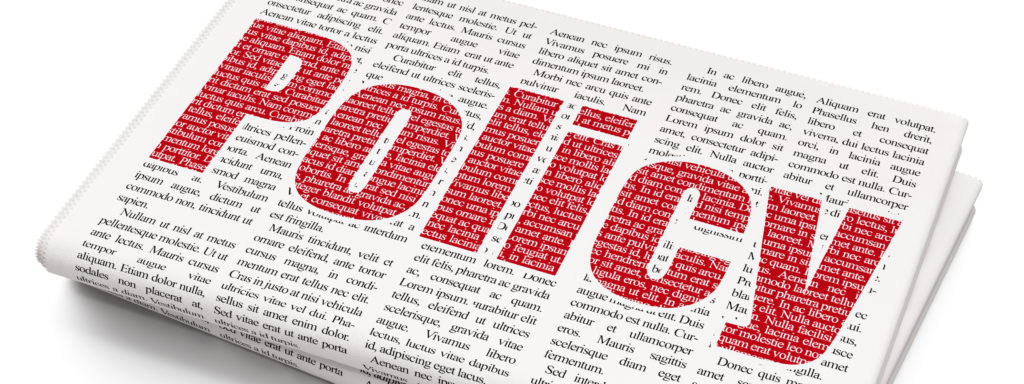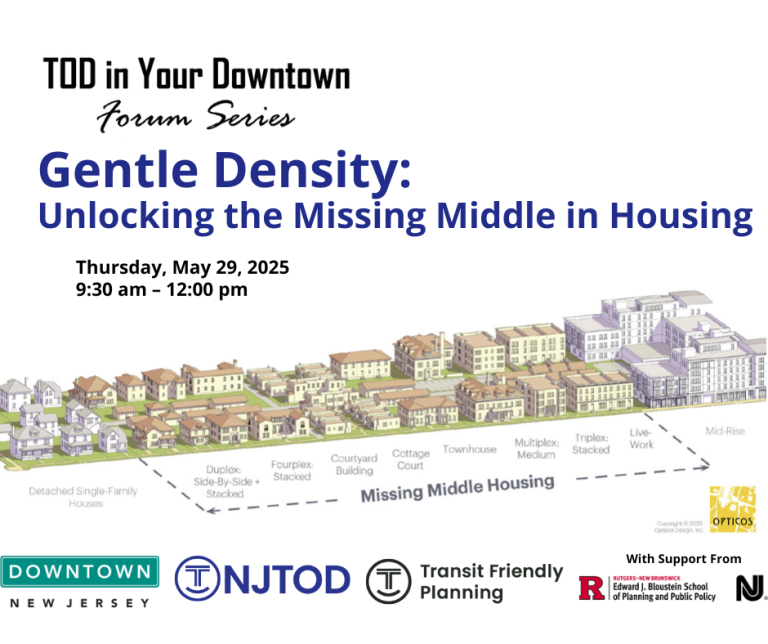DNJ Policy Watch – March 2018
Courtenay Mercer, PP, AICP
Executive Director, Downtown New Jersey
March 12, 2018
Downtown New Jersey acts as an advocate for downtown commercial districts in New Jersey, tracking judicial and legislative issues that can affect the success of the state’s downtowns and then informing and educating members on these issues. NJ is in a new Legislative Session with a new Gubernatorial Administration – so a flurry of new and rehashed legislation was posted after the New Year. Below is legislation we’ve been watching that could impact downtowns.
Redevelopment – Financial
- A2041 & S1840: “Economic Redevelopment and Growth Grant Bond Financing Act,” authorizing issuance of bonds secured by pledge of Economic Redevelopment and Growth Grant proceeds, municipal liens, and special assessment; expands “Redevelopment Area Bond Financing Law;” extends time to complete certain projects under “Long Term Tax Exemption Law.”
The legislation authorizes municipalities to raise cash to assist private development by issuing bonds backed by Economic Development Authority tax incentives. The bill already passed the Assembly and was referred to the Senate where it was reported out of the Economic Growth Committee for second reading on February 22nd.
Related Articles:
Push to give towns more power to entice developers with special bonds – NJ Spotlight
EDITORIAL: No debt, no problem? Maybe – My Central Jersey - A1311 & S2031: “Historic Property Reinvestment Act”; provides credits against certain taxes for certain costs of rehabilitating historic properties.
The legislation authorizes an income tax credit for a portion of the rehabilitation costs of qualified historic owner-occupied residential and commercial properties. DNJ made statements in support of a historic preservation tax credit in its January 5, 2018 Memo to the Murphy Transition Team. A prior version of this bill was passed out of the Legislature with bipartisan support, but vetoed by then Governor Christie. This bill was introduced in the Assembly and referred to the Agriculture and Natural Resources Committee on January 9th. A companion bill was introduced in the Senate and referred to the State Government, Wagering, Tourism & Historic Preservation Committee on February 28th. - A2441: Establishes Main Street Economic Growth Program to encourage business development in small, highly developed municipalities.
The legislation authorizes corporate business tax and gross income tax credits, as well as loans and technical assistance to businesses within a “Main Street area” as designated by a municipality with a population under 11,000 and is 70% developed. The bill was reported and referred to the Assembly Appropriations Committee on March 5th. - A1183 & S2256: Establishes Main Street Assistance Program to encourage business development in small municipalities.
The legislation authorizes corporate business tax and gross income tax credits, as well as loans and technical assistance to businesses in Main Street areas within small municipalities, which are defined as having a population under 20,000 and is over 75 percent developed. The bill was introduced in the Assembly and referred to the Commerce and Economic Development Committee on January 9th. A companion bill was introduced in the Senate and referred to the Economic Growth Committee on March 8th.
- A2561 & S2234: Allows corporation business tax credits as incentives for redevelopment of distressed shopping centers.
The legislation establishes a program to certify taxpayers that make retail investments to redevelop partially or completely vacant shopping centers in New Jersey as eligible to receive a corporation business tax credit of up to $15,000, but not exceeding the amount of 50 percent of corporation business tax owed by the taxpayer. The bill was introduced in the Assembly and referred to the Commerce and Economic Development Committee on February 1st. A companion bill was introduced in the Senate and referred to the Economic Growth Committee on March 8th.
- S867: Imposes prevailing wage for public work on properties receiving tax abatements or exemptions.
The legislation imposes a prevailing wage on any project receiving tax incentives. DNJ made statements on a prior version of this bill in a December 8, 2017 article, and its January 5, 2018 Memo to the Murphy Transition Team. The bill was introduced in the Senate and referred to the Labor Committee on January 9th. An Assembly companion bill has not been introduced.
- S59: Requires municipalities to share certain payments received in lieu of property taxes with school districts; informs counties and school districts of application for property tax exemption.
The legislation requires that a municipality remit a portion of its annual service charge revenue to its school district(s) in an amount calculated by multiplying the number of schoolchildren in the approved project by the average budgetary cost per pupil in the district. DNJ made statements on a prior version of this bill in a December 8, 2017 article, and its January 5, 2018 Memo to the Murphy Transition Team. The bill was introduced in the Senate and referred to the Community and Urban Affairs Committee on January 9th. An Assembly companion bill has not been introduced.
- A345: Requires cost-benefit analyses and local government financial impact findings for approval of long term property tax exemption.
The legislation requires both the applicant for a long-term property tax exemption and the municipality to conduct a cost-benefit analysis of the project’s impact on the finances on affected governments. The bill was introduced in the Assembly and referred to the State and Local Government Committee on January 9th. A Senate companion bill has not been introduced.
- A3536 & S1837:Establishes Emerging Technology Urban Grant Program in EDA; appropriates $20 million.
This legislation establishes the Emerging Technology Urban Grant Program to award grants to qualifying emerging technology businesses to encourage the businesses to locate in one of three urban technology zones to acquire cloud computing services that will facilitate the businesses to grow and create full-time employment. The bill was introduced in the Senate and referred to the Economic Growth Committee on February 8th. A companion bill was introduced in the Assembly and referred to the Science, Innovation and Technology Committee on March 5th.
Redevelopment – General
- A3075 & S597: Encourages development of public electric vehicle charging infrastructure in redevelopment projects.
The legislation adds definitions of electric vehicle charging stations (EVCS), authorizes EVCS to be included in redevelopment plans and projects, and allows municipalities to use redevelopment funding streams to build public EVCS. The bill was introduced in introduced in the Senate and referred to Senate Environment and Energy Committee on January 9th. A companion bill was introduced in the Assembly and referred to Commerce and Economic Development Committee on February 8, 2018.
Liquor Licenses
- A1318 & S2219: Permits municipalities to issue retail liquor licenses for use in certain historic taverns.
The legislation authorizes municipalities to issue permits to sell alcoholic beverages for on-premise consumption in abandoned historic taverns. The bill was reported out of the Assembly Oversight, Reform and Federal Relations Committee for second reading on February 8th. A Senate companion bill was introduced and referred to the Community and Urban Affairs Committee on March 8th. - A2011 & S1199 : Permits municipalities to hold certain inactive liquor licenses reserved for smart growth developments for an additional five years.
The legislation allows a municipality that acquired an inactive plenary retail consumption license that remains inactive on the bill’s effective date to maintain that license in an inactive status for up to five additional years. The bill was reported out of the Assembly Oversight, Reform and Federal Relations Committee with Amendments for second reading on February 8th. A companion bill was introduced in the Senate and referred to Senate Law and Public Safety Committee on January 25, 2018.
- A1505: Creates new liquor licenses for certain restaurants and permits the issuance of additional liquor licenses; provides tax credit under corporate business tax and gross income tax for fair market value of certain alcoholic beverage licenses.The legislation allows municipalities to issue restricted restaurant, and beer and wine licenses for use in connection with restaurants that occupy a minimum square footage of 1,500 and a maximum square footage of 6,000 and maintain a full-service kitchen with a minimum square footage of 500. The bill was introduced in the Assembly and referred to the Oversight, Reform and Federal Relations Committee on January 9th. A Senate companion bill has not been introduced.
- S1648 & A1478: Permits theaters with 100 seats or more to apply for liquor license.
This legislation reduces from 1,000 to 100 the number of seats required for a theater to be eligible to apply for a special license to serve alcoholic beverages on the premises. The bill was introduced in the Assembly and referred to the Oversight, Reform and Federal Relations Committee on January 9th. A companion bill was introduced in the Senate and referred to the Law and Public Safety Committee on February 8th. - A2008: Provides for transfer and sale of inactive liquor licenses for use in qualifying smart growth municipalities.
The legislation repeals sections P.L.2007, c.351 (C.33:1-24.1 and 33:1-24.2) which permits special permits for the service of alcoholic beverages in smart growth development projects; and allows for the purchase of inactive plenary retail consumption licenses private interests. The bill was introduced in the Assembly and referred to the Oversight, Reform and Federal Relations Committee on January 9th. A Senate companion bill has not been introduced.
- S2168 & A1029: Allows municipality to issue permits to sell alcoholic beverages in residential redevelopment areas.
This legislation allows for the issuance of permits to sell alcoholic beverages within the redevelopment district of certain municipalities that have adopted a Smart Growth Redevelopment Plan. The bill was introduced in the Assembly and referred to the Oversight, Reform and Federal Relations Committee on January 9th. A companion bill was introduced in the Senate and referred to Law and Public Safety Committee on March 5th.
Urban Enterprise Zone
- S846 & A3549: Reinstates and extends duration of certain UEZs; requires DCA to study UEZ program and report recommendations to the Legislature.
The legislation reinstates expired UEZs until December 31, 2023; and extends the term of those UEZs that expire prior to that date. It also requires the Department of Community Affairs (DCA) to study the UEZ program and to submit to the Legislature a report and recommendations. A version of the bill passed the Senate on February 26th, and was received by the Assembly and reported out of the Appropriations Committee on March 22nd; and a floor amendment passed on March 26th. - A2982: Allows certain municipalities to establish lower property tax rate on improvements than land and eliminates urban enterprise zone program.
The legislation eliminates the Urban Enterprise Zones (UEZ), but allows former UEZs to employ a land-based property tax system, which is defined in the legislation as a property tax system under which taxable improvements are taxed at a lower rate than taxable land. Other municipalities may apply to the Division of Taxation to adopt a similar measure. The bill was introduced in the Assembly and referred to the Commerce and Economic Development Committee on February 8, 2018. A Senate companion bill has not been introduced.



